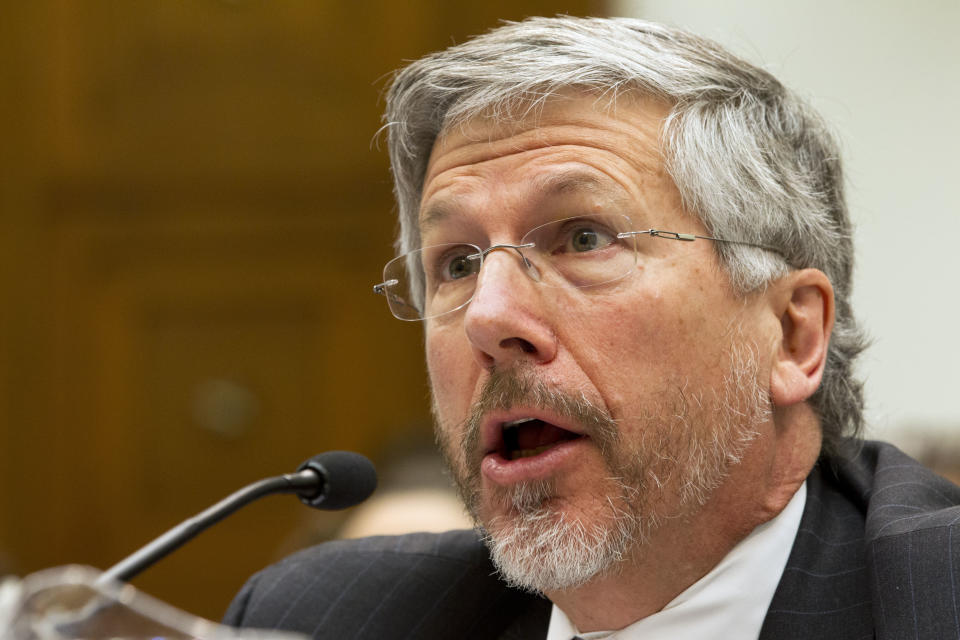Former top Obama intel lawyer praises 'very shrewd' indictment of Assange for skirting First Amendment issues
WASHINGTON — The former top lawyer for the U.S. intelligence community under President Barack Obama is praising the Justice Department indictment of Julian Assange, calling it a “very shrewd” charge that avoids infringing on freedom of the press issues that stymied his Obama administration colleagues.
“I think the Department of Justice was very shrewd in how it approached this,” said Robert Litt, who served as chief counsel to the director of national intelligence between 2009 and early 2017. Litt was interviewed for the Yahoo News “Skullduggery” podcast.
“For years it's been known that the government has been investigating Assange and there has been a constant drumbeat of legitimate concern about the prospect of indicting somebody for publishing material that was provided to them.
“And the question has always raised, How do you differentiate Julian Assange from the New York Times and the Washington Post?”
But, Litt argued, the indictment of the WikiLeaks founder unsealed this week successfully avoids the issue by narrowly focusing on a single conspiracy charge: that Assange offered to help Chelsea Manning, then a U.S. Army private, crack the password of a classified Defense Department computer.
Although the alleged conspiracy apparently never led to any additional secrets stolen — Assange is quoted as telling Manning in an online chat “no luck so far” — it provided a basis for a criminal charge of conspiring to violate a federal computer law.
“I think it has been significant that virtually all of the big media have been leaping on this as saying, well you know, this is fine, we wouldn't do anything like this,” Litt said about what Assange is accused of doing.
“I think that to the extent the message that's being sent is — ‘We don't have a problem with people publishing things, we have a problem with people using illegal means to obtain information to publish’ — I don't think that's a bad message,” Litt said. “Reporters shouldn't be breaking into places where they don't belong to get information.”
Download or subscribe on iTunes: “Skullduggery” from Yahoo News
There are dissenters from the support for the Assange indictment, however. Describing Assange as a “publisher,” Daniel Ellsberg, the famed whistleblower who leaked the Pentagon Papers to the New York Times during the Vietnam War, called his indictment “a very serious assault on the First Amendment.”
And Assange’s U.S. lawyer, Barry Pollack, signaled plans to raise a similar argument if his client is extradited from the United Kingdom to face the charge. “The factual allegations against Mr. Assange boil down to encouraging a source to provide him information and taking efforts to protect the identity of that source,” he said in a statement after the indictment was unsealed. “Journalists around the world should be deeply troubled by these unprecedented criminal charges.”

Litt’s perspective is noteworthy given that he was in the middle of an intense Obama administration debate about how to treat Assange after WikiLeaks published hundreds of thousands of classified documents supplied by Manning about the Iraq and Afghanistan wars, and State Department cables that included embarrassing details about corruption and abuses in governments around the world. Many of these documents were then published by the New York Times and other major U.S. news organizations, making it difficult for the Obama Justice Department to figure out how to prosecute Assange for revealing classified material without also going after the mainstream news organizations that were publishing the same documents.
Acknowledging there was a “a lot of discussion” within the Obama administration about what to do about Assange, Litt was asked if he had favored prosecuting the WikiLeaks leader. “Yes and no,” he replied. “I think yes in the sense of, everybody was extremely upset with him and what he was doing. No, in the sense of people were sensitive to the First Amendment. I mean, the intelligence community actually does care about things like this. … We don't want to violate constitutional rights, and more than that, there's also an important principle: You don't get into a public relations war with somebody who buys printers’ ink by the barrel.”
Litt said he anticipates that Assange will face additional charges beyond the single conspiracy count. The fact that prosecutors have jailed Manning for refusing to testify before a federal grand jury about her dealings with Assange strongly suggests they are considering additional charges, which might come before the WikiLeaks founder’s extradition hearing in two months. (Extradition treaties generally specify that defendants cannot face additional charges filed after they were extradited without the express permission of the country that is returning the suspect.)
“I think they're certainly looking at the possibility of a superseding indictment,” Litt said. “And I think if they're going to return one, it should be returned before the extradition proceedings get going.”
_____
Read more from Yahoo News:



